Kaarle goes all in: The Coffee Ride #191, with Reece Homfray
KAARLE McCulloch explains how having her head held under water has helped her become a better cyclist, news on Australia’s team for the road world championships, a world record holder has ankle surgery and Aussie transfer news.
- Thomas’ triumph one for the good guys
- Spat at, booed, but Sky didn’t cave in
- Picture special: Brutality of the Tour
HOW KAARLE IS BEATING THE ‘FIGHT OR FLIGHT’ INSTINCT
KAARLE McCulloch is fighting the urge to breathe while her head is being held under water and it is excruciating.
NSWIS sports psychologist Gerard Faure Brac has both hands on McCulloch’s shoulders and the top of her head is 30cm below the surface of the pool at Sydney’s Olympic Park as the seconds tick by.
15, 20, 25, 30, 31, 32, 33 … McCulloch is an Olympian, world champion and Commonwealth Games gold medallist but even she is finding it uncomfortable.
It’s hardly normal behaviour or a routine part of McCulloch’s training but that’s the whole point.
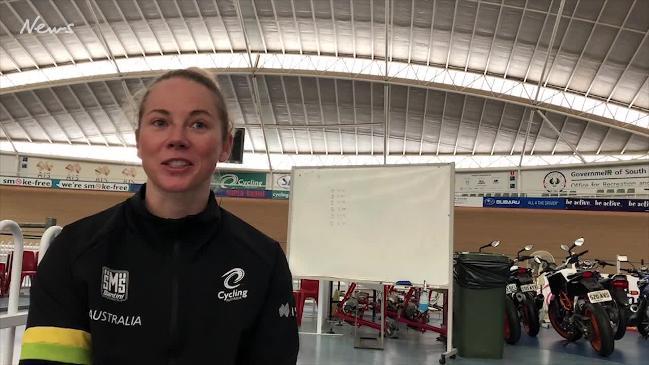
If she can teach herself to stay calm when the “fight or flight” instinct kicks in, then walking into her natural environment of a packed velodrome on race day should be a lot easier.
What’s more if when she thinks she’s out of breath and on the verge of “tapping out”, only to then try to swim as fast and as far as she can on that same breath, then she is teaching her body to find something when her brain thinks there is nothing else to give.
“We’re both in a wetsuit and we start out slow, holding your breath under the water, then gradually increasing the intensity of it,” McCulloch said.
“Gerard would then be in the water with me holding me in, then it would progress to him holding me under and I would tap out when I was ready to come up.
“Then we’d move on to holding my breath as long as I could static and then try to swim as fast as I could and as far as I could, to see what the element of physical movement does to that fight or flight response.
“It was really interesting and I learnt a lot about how you can control that response. Some days when I went in the water and was quite fatigued from training I wasn’t as good, and the brain is a funny thing — really powerful.”
You walk into the velodrome on race day, it’s big and bright and that fight or flight response is real, it’s there.
McCulloch, 30, is now the veteran of the Australian sprint cycling team which is heading towards its next major goal at the 2020 Tokyo Olympics.
It’s nine years since she became world champion for the first time with Anna Meares in the team sprint in Poland and eight years since her first Commonwealth Games gold medal in India.
Yet McCulloch feels like the best is still to come. Track sprinters are renowned for peaking in their early 30s and being challenged by a new gym program and revolutionary brain training, she feels as driven as ever.
“I’m really excited about what we’re doing, we’re still evolving our brain training, it’s an area of the sport I don’t think has been highly tapped into,” McCulloch said.
“It’s not really measurable because you can’t do a whole heap of brain training and then win a gold medal and say that’s what won it for you.
“But in my experience I can definitely say it contributes.
“Things like at the Commonwealth Games where I’d done this visualisation prep and work where I had to beat the fight or flight response in the water.
“You walk into the velodrome on race day, it’s big and bright and that fight or flight response is real, it’s there, and you have to figure out a way to manage it because not only with our sport do you have to go out and do an 18-second effort, you have to do it consistently over five days.
“You don’t want to burn all your energy as well, there’s a lot of conserving mental and physical energy.”
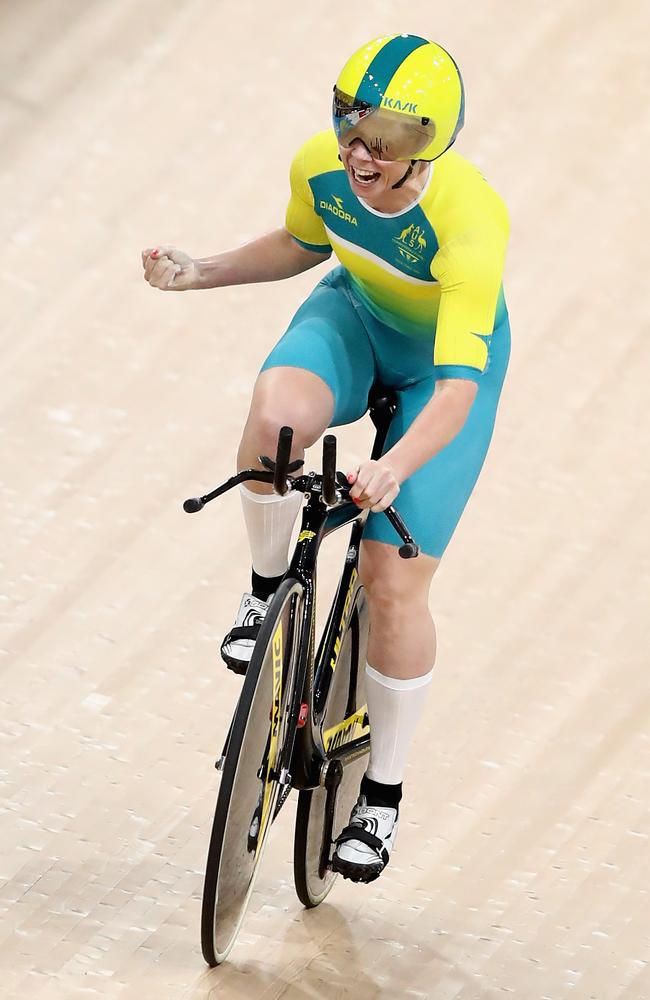
The brain training has extended to an app on her phone which involves challenging herself mentally before an effort at training.
“We’re working on new project at the moment where we fatigue the brain before we go and do efforts. Our sport is all about making decisions in really intense situations under a lot of pressure — when you have a microsecond to make a decision,” McCulloch said.
“So I do something I’m cognitively not very good at, and for me that’s maths, I get really irritated with numbers and have to work really hard with them.
“I’ll play one of those games on my phone before training then go and do an effort, and it is quite fatiguing.”
The feeling of fatigue comes flooding back to McCulloch and her teammates like an old friend every winter. Under coach Nick Flyger they are now in a “max strength phase” which has left them feeling “all very domsy” — delayed onset muscle soreness.
The older I’ve got the more that I’ve figured those things out, so the experience pays off in the end.
But McCulloch, who moved back to Adelaide from Sydney in January, is loving it.
“The gym program has been quite different, I’m still having some adjustments with that but everything we’re doing is showing I still have so much more to gain,” she said.
“I’ve been doing this for 10 years now so I feel really excited about where I’m going, the gym is different, we’re doing a lot more, and the change has been really welcomed.
“It doesn’t take me as long now to start hitting back the big weights because my body has that muscle memory I suppose,” she said.
“I also understand my body a lot more so I know what days not to push too hard because something might not feel quite right.
“I understand also that you don’t have to be lifting the heaviest weights in the gym to be riding the fastest times on the track.
Outside of training McCulloch is completing a bachelor of education (secondary teaching) at university and has about one year of full-time study to go, but she doubts she’ll end up teaching when her cycling career is over.
“All my family are teachers pretty much, my mum, my stepdad, my sister, so I don’t know it was just natural,” she said.
“I actually don’t want to be a teacher any more but I want to finish the degree because it gives you many more avenues to go into.
“I like the change in thinking, it’s really healthy, the subjects I’m doing are really interesting and when I retire I will probably step into some sort of coaching role and all that correlates quite strongly.”
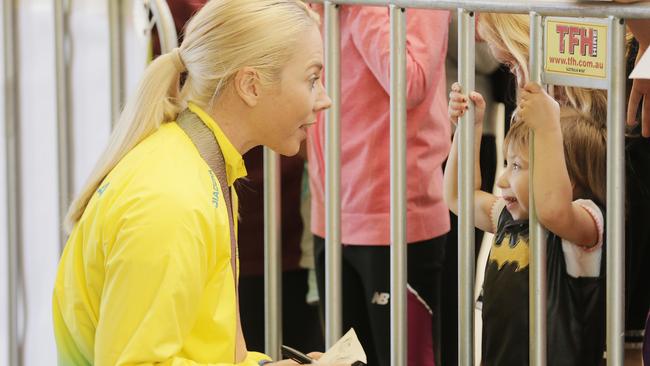
The determined sprinter admits at times she was in a hurry early in her career when she needed to be patient.
“It’s ironic now I suppose watching some of these younger people come through and thinking to myself ‘gee they just need to slow down here’ but I can see myself in some of those younger ones,” she said.
“It’s just what happens when you’re younger, you want everything right now, tomorrow, before it’s even here and it takes six to eight years as a strength/power athlete to be riding world class and that’s hard to accept when you’re 20 years old.”
As well as the art of patience, McCulloch has learnt to “love the process” which isn’t always easy in a brutal sport that doesn’t offer a lot of money and only limited racing opportunities. To stick at it for a decade and heading into a third Olympic cycle is a credit to McCulloch’s mental and physical toughness.
“You have to enjoy the process and I’ve always enjoyed the hard parts of what we do,” she said.
“I don’t mind that I have to eat very plain, basic food, and I don’t mind that it does take time to see a benefit from something that you’ve done.
“We race four months of the year and in that time we might only have three races and so most of our hard work is done in the cold Adelaide SuperDrome in the winter, and you’re working so hard to go half-of-a-tenth-of-a-second faster.
“But they’re hugely significant, you win and lose races by half a tyre width, so it’s knowing that which makes the off-season bearable. I think about those things a lot when it gets hard in the winter, that you can win and lose by the smallest of margins and that motivates me.”
July 24 marked exactly two years to go until the 2020 Tokyo Olympics and McCulloch is counting down the days.
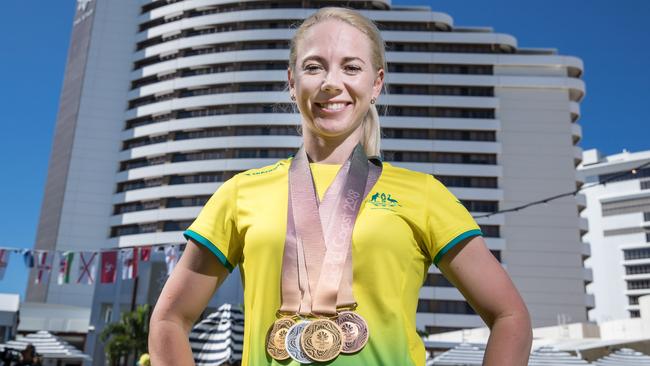
“When you think about that and say 730 days it sounds like a long time but you break it down into 102 weeks or 24 months, and we actually don’t have much time,” she said.
“And there are quite a few benchmark events in that time like the world championships in Poland next year where I’ve set a hefty target to try to win the team sprint with hopefully Steph Morton, I’d love to do that, that’s where Anna and I won our first world title in 2009.”
McCulloch won a bronze medal on Olympic debut in London in 2012 with Anna Meares in the team sprint. She missed out on selection for the Rio Olympics in 2016 but was given the option of travelling with the team as a reserve.
“It took me a week to make that decision,” she said.
“I went to and fro and had big arguments with my family, I was a pretty grumpy person, and in the end I decided to go and didn’t really know why.
“But when I was sitting in the stands in Rio during competition I remember thinking ‘I should be there right now’ and that’s what has motivated me.
“I think about those moments and they don’t irritate me or make me angry anymore, they inspire me, and I hope I don’t have to experience that again and instead I can be the one out on the track and racing for gold medals in Tokyo.”
Her decision to stay the course was vindicated at the Gold Coast Commonwealth Games in April where she won gold in the 500m time trial and in the team sprint with Stephanie Morton.
“All the things I went through in the last Olympic cycle, as tough as they were have made me a better person and better athlete,” she said.
“I think that can only hold me in really good stead because gold medals don’t get handed out, you have to work hard, and I feel like I am working hard and have been through the ups and downs.
“And the Commonwealth Games showed me I made the right decision to stick around.”
QUICK SPIN …
Ankle surgery for Porter
AUSTRALIAN team pursuiter Alex Porter is recovering from ankle surgery that will keep him out of full training for the next four weeks.
Porter, who was part of the world record breaking ride on the Gold Coast in April, had a piece of bone removed from his left ankle a fortnight ago and was cleared to ride on his ergo trainer for 15 minutes on Friday.
“The bone was out the back of the ankle and rubbing on the tendons, it flared up about two years ago and settled down but played up again in my last race in Europe,” Porter said.
“So I had the surgery and am now slowly getting back into it. It will take a bit of time but I’ll gradually build back up to be in full training in 4-6 weeks.”
The other thing that’s gone from Porter post Comm Games is his infamous mullet haircut which he’d been growing since July, 2017.
“I looked at myself in the mirror one day in Europe and thought ‘yep, it’s time’,” he said.
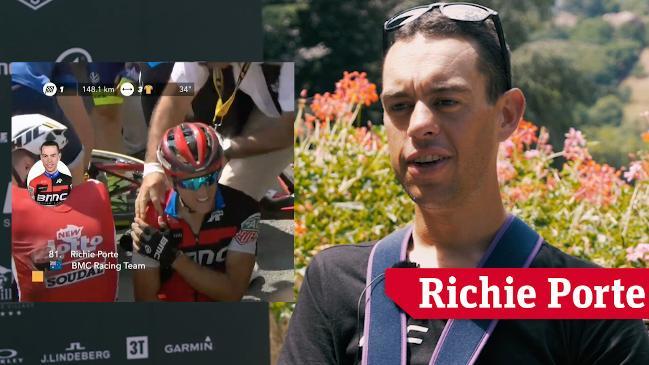
Road worlds team announcement
CYCLING Australia selectors have reached out to Richie Porte ahead of a meeting to plan the team for the road world championships next week.
It’s understood Porte is keen to ride the road race in Innsbruck, Austria, after racing the Vuelta a Espana as he salvages his season from a broken collarbone in the Tour de France last month. He is back on the stationary trainer at home as his recovery progresses.
Australian selectors will meet next week and the team is set to be named in mid-August ahead of the worlds from September 22-30.
Dennis, Porte, Ewan on the move
ROHAN Dennis’ move to Bahrain-Merida is set to be made official now that the August 1 transfer window has opened.
The Australian time trial specialist extended his contract with BMC in 2016 but is on the move after the team lost its major sponsor for next year.
Also on the move is Richie Porte who has been linked to a new deal with Trek-Segafredo for 2019 and Caleb Ewan who is set to take Andre Greipel’s hot-seat at Lotto.
Ewan was controversially left off Mitchelton-Scott’s roster for the Tour de France and returned to racing in the Ride London Surrey Classic on Sunday where he was a DNF.
TDU route announcement
THE Tour Down Under is set to reveal the course for the 2019 edition of the race on Wednesday and it’s tipped to include a major change.
The queen stage on Old Willunga Hill has been moved from its traditional Saturday timeslot and there is uncertainty over whether it will be included at all.
The Saturday Stage 5 will instead incorporate the annual Challenge Tour participation ride and take cyclists 158.7km from Glenelg to Strathalbyn.

